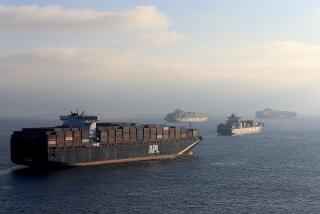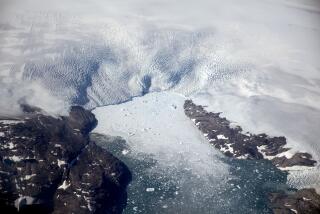Greenhouse Gases Could Alter Ocean Currents, Global Temperatures, Researcher Says
WASHINGTON — Currents flowing like rivers from pole to pole and from ocean to ocean help keep the Earth’s weather in a steady state, but the buildup of greenhouse gases in the atmosphere is threatening this circulation and could dump Europe into a deep freeze, a researcher says.
The dependable pattern of ocean circulation is a key factor in controlling the Earth’s weather and keeping it predictable, says Wallace S. Broecker of the Lamont-Doherty Earth Observatory of Columbia University in Palisades, N.Y.
But this has only been true for the last 8,000 years. Before that, ocean currents altered about every 1,000 years and scrambled the Earth’s climate, Broecker says in a study to be published today in the journal Science.
“We live in a climate system that can jump abruptly from one state to another,” Broecker says. By dumping into the atmosphere huge amounts of greenhouse gases, such as carbon dioxide from the burning of fossil fuels, “we are conducting an experiment that could have devastating effects,” he adds.
“We’re playing with an angry beast--a climate system that has been shown to be very sensitive,” he says.
The study findings come as representatives from more than 140 nations prepare to gather in Kyoto, Japan, next week in hopes of forging an agreement committing industrial nations to specific reductions of greenhouse gases, especially carbon dioxide from burning fossil fuels.
Broecker says studies of ice cores that date back 110,000 years show that about once a millennium the Earth’s climate abruptly changes and within 10 to 20 years can cause such things as increased glaciers, halting of rainfall or crippling declines in temperature.
Ocean currents are controlled by the temperature and salt content of the water, according to the researcher. Cold, salty water is heavy and drops to the ocean bottom, while warm, fresh water rises.
This creates what Broecker calls a “conveyor” current that spans the globe. Cold, salty water in the North Atlantic sinks, working like a plunger to drive an ocean current from near North America to Europe. Warm surface waters borne by this current help keep Europe’s climate mild.
Without the current, Broecker says, “Europe would be a deep freeze” with average winter temperatures dropping by 20 degrees Fahrenheit or more. The climate of Dublin or London would be like that of Spitsbergen, Norway, which is 600 miles north of the Arctic Circle, he said.
The conveyor now flows past Europe, into the South Atlantic and then around Antarctica. The waters cool and pick up more salt, giving the current another boost. From the South Pole, the currents fan out into the Indian and Pacific Oceans and into the Atlantic to complete the cycle.
Broecker says the currents help to bring rain in seasonal cycles of moisture that farmers count on to plant crops.
If the currents are disrupted, he says, then agriculture would suffer. With a changing climate, there would be many more crop failures until farmers learned to cope with the changes.
Broecker says his studies suggest that the conveyor is the “Achilles heel of the climate system” and a fragile phenomenon that can change rapidly for reasons not understood.
For instance, he says, it would take only a slight rise in temperature to keep water from sinking in the North Atlantic, and this would bring the conveyor to a halt. Broecker says it is possible that warming caused by the buildup of greenhouse gases could be enough to affect the ocean currents dramatically.
J.D. Mahlman, noted climate scientist at Princeton University, called Broecker’s theory “interesting speculation,” but he said there is no immediate evidence to show that the buildup of carbon dioxide in the atmosphere could disrupt the ocean currents.
He acknowledged, however, that there are still great uncertainties in the understanding of how the Earth’s climate changes and the precise effect of all the factors that affect the weather.






